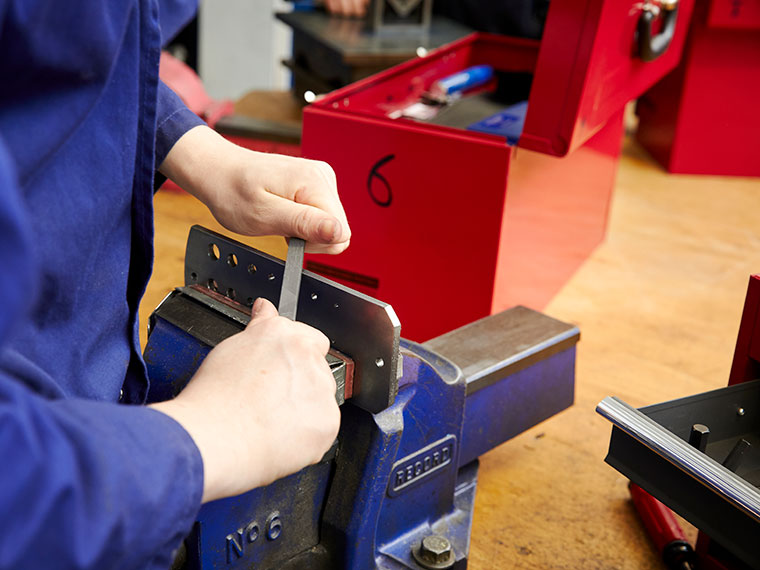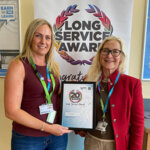Student Spotlight: Meet Spencer, a higher-level engineering apprentice from University Centre Rotherham
For many young people, they often feel the need to choose between studying or working. But for Spencer Mallender, a higher-level apprenticeship in engineering meant he could do both.
Thanks to his employer’s commitment to developing future engineers, Spencer is earning a level 5 HND qualification at University Centre Rotherham while working full-time as a maintenance technician, taking full advantage of a pathway that blends employer support with university expertise.
Spencer’s journey into higher education
Engineering wasn’t Spencer’s first plan. At school, he considered studying sports psychology or physiotherapy, but soon realised the career options didn’t align with the future he wanted.
With his dad working as design sigma engineer and an interest in how things work, Spencer began to see engineering as a more sustainable, long-term pathway.
He enrolled on a vocational Level 3 engineering course at Rotherham College which confirmed that he was heading in the right direction.
“I like the hands-on side of learning. I never considered A-levels or sixth form because I’ve always preferred practical work,” he says.
After doing a work placement module, Spencer started thinking about going down the apprenticeship route to strengthen his technical skills and help him progress while giving him a chance to earn money.
For Spencer, an apprenticeship offered something he couldn’t get from classroom study alone: real engineering experience.
“I’d been in a traditional classroom setting since I was five years old and I was burnt out – I didn’t think I had it in me to go down the normal university and degree route but I wanted to keep learning,” he says.
When the opportunity to apply for an apprenticeship at power management company Eaton arose in 2019, he jumped at it. Over 70 students applied and Spencer was the successful candidate.
The standardised programme meant beginning at Level 2, regardless of prior study, but Spencer has taken every opportunity given to him.
“I wanted to get as many qualifications as I can. The company was willing to pay for my education so I was willing to go on and do it.”
He’s worked his way back up over the last six years gaining qualifications at levels 2, 3 and 4, for which his employer used their apprentice levy to fund the course fees.
Spencer is now in his final year at University Centre Rotherham, completing a Level 5 HND in electrical engineering, the equivalent of a foundation degree.

Balancing work and study at University Centre Rotherham
Juggling a demanding engineering role and higher education studies requires commitment, but Spencer has embraced the challenge.
The strong partnership between Eaton and RNN Group meant Spencer could train locally, study flexibly, and develop skills directly relevant to his day-to-day work.
He currently works four days a week at Eaton’s Worksop site doing daytime and afternoon shifts. He then has a day release every Monday for his lectures and coursework at University Centre Rotherham, spending one full day at the town centre campus.
The HND course cohort is mainly made up of higher-level apprentices in their mid-20s like Spencer who have progressed up to higher education and come in on day release.
There are also some older adults who have been working in industry for many years and now need a higher education qualification to take that next step in their career into supervisory and management roles.
The department is led by former test engineer Andy Jordan, who’s worked for companies like Hewett Packard, Dell, Sun Microsystems, BAE and ITT corporation. He’s joined by Lee Alexander who has experience of working in military defence and aerospace engineering and also knows what it’s like to study while working – he did his master’s degree as a mature learner while working full-time and raising a family.
“The environment at University Centre Rotherham is quite relaxed. It’s like a real-word scenario. We call tutors by their names and they treat us like adults – but it’s a two way thing,” says Spencer.
“They understand that we’re working and if we’ve got a doctor’s or dentist appointment they don’t expect us to get a note. But they’re also willing to go out of their way to help you if you’re stuck on a module or need to catch up on anything if you’ve fell behind because of work commitments.”
Real-world experience through apprenticeship
Eaton’s Worksop branch focuses on switch gear manufacturing and plastic injection moulding. Spencer’s role as a multi-skilled maintenance technician means he works across the whole site fixing and maintaining their machines.
“I don’t like doing the same thing day in day out. With maintenance engineering, every day is different. You don’t know what you’re walking into and I like that it’s such a varied role.”
Working at Eaton has given Spencer direct exposure to modern engineering environments, safety protocols, preventative maintenance, and continuous improvement processes.
You don’t get that level of context in a classroom alone. He credits the hands-on nature of the apprenticeship structure with accelerating his development.
“The only way an apprentice learns is by doing. When you’re watching and watching, you lose interest. The best way to keep them engaged and interested is to give them to tools and let them crack on.
“Looking back five years ago, I remember thinking I’d never remember anything I was being shown. It all went over my head. But as it’s drip-fed every week it starts to click and now it’s become second nature to me.”
How higher education benefits engineers like Spencer
Higher education offers far more than a qualification. It gives engineers the deeper understanding and professional confidence needed to progress in an industry that never stands still.
For apprentices like Spencer, studying at Level 5 strengthens the technical foundations they learnt at levels 2 and 3 that underpin everyday decisions on the workshop floor, from diagnosing faults to improving system performance.
Engineers learn the business model and lean manufacturing that sit behind the machines, processes, and technologies they work with. Instead of simply fixing faults, they understand why issues occur and how to prevent them to maximise customer value and reduce waste.
Higher education also helps engineers develop wider professional skills such as project planning, leadership, communication, and critical thinking – qualities essential for progression into senior roles.
“Communication is key in our line of work. I work amongst all the other departments in the company so I have to talk to operators and find out what’s wrong with a machine. If you’re a bit shy then you soon learn to come out of your shell as you’ve got to talk to people.”
Most importantly, working while studying means apprentices can apply what they learn immediately, reinforcing their understanding and bringing fresh insights to their workplace.

Career ambitions
Now in the final year of his HND, Spencer is already thinking ahead about what his plans are for after graduation.
While he could go on to do a top-up year to achieve a full degree, he’s eager to become a fully-fledged engineer.
“I’d like to climb the ladder when it suits. I never wanted an office job but I know I won’t be on the tools all my working life, only until by body can’t do it. It’s alright crawling over machinery when you’re 25 but when I get to 55 I’d hope I’d be away from shop floor and be in leadership or management roles.
“Having this level 5 qualification will mean that, if in five or ten years’ time a supervisor role comes up, I’ll know the business model, how the business works, and the methodologies that will help me in a leadership role.”
Spencer’s advice to others
Reflecting on his journey so far, Spencer encourages others considering an apprenticeship route to take the leap.
“If you’re interested in engineering, you can do a traditional degree but that doesn’t come with the experience that’s crucial for your career. There are a lot more avenues now but it’s so saturated.
“If you’re motivated and want a hands-on route into engineering, an apprenticeship is the best of both worlds. You build experience, gain a degree, and develop skills that are in demand across the industry.”
Learn more about Higher and Degree Apprenticeships at University Centre Rotherham











